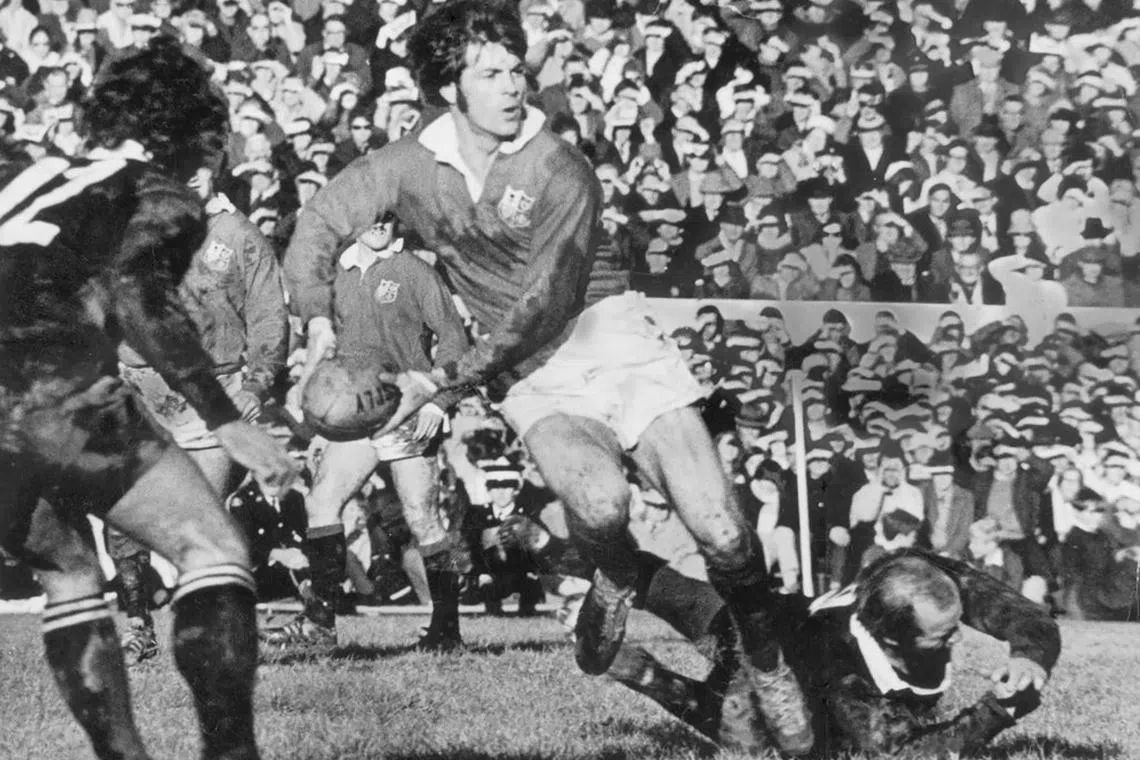Barry John, ‘The King’ of Welsh rugby, dies at 79
Sign up now: Get the biggest sports news in your inbox

Welsh player Barry John in action during the British Lions' tour of New Zealand, in 1971.
PHOTO: GETTY IMAGES
Follow topic:
CARDIFF – Barry John, known as “The King” of Welsh rugby during a golden era and arguably the sport’s first superstar, has died. He was 79.
“Barry John died peacefully today at the University Hospital of Wales surrounded by his loving wife and four children. He was a loving Dadcu (grandfather) to his 11 grandchildren and much-loved brother,” said a statement from his family on Feb 4.
John shot to fame after guiding the British and Irish Lions to a Series victory over New Zealand in 1971, a period when rugby union was still amateur.
But the fly-half hung up his boots at the age of 27, unable to cope with the attention that followed the oval ball’s then-equivalent of Manchester United’s George Best.
“Barry was just about reaching his zenith then. He should have stayed in rugby a damned sight longer than he did. The world never saw the best of Barry John,” Wales and Lions No. 8 Mervyn Davies said in Peter Jackson’s book, Lions of Wales.
Born in Cefneithin, north-west of Swansea, in 1945, John first played first-class rugby for Llanelli before moving to Cardiff in 1967, when he notably partnered legendary scrum-half Gareth Edwards.
John made his debut for Wales in a 14-11 defeat by Australia in 1966 and went on to win 25 caps. He was first selected for the Lions on their 1968 tour of South Africa, but it was a short-lived experience as he broke a collarbone early in the first Test against the Springboks.
John rebounded a year later in a Welsh team that won the 1969 Five Nations Championship.
Wales shared the tournament with France a year later before sealing their first Grand Slam since 1952. Players in that 1971 Championship-winning side, still feted as one of the best fielded by Wales, became household names.
Then came the famed Lions tour to New Zealand, when John played in 17 of the 26 tour matches and cemented his fame as the “conductor of the orchestra”. His pinpoint kicking was vital as the Lions notched up a 9-3 victory over the All Blacks in the first Test. New Zealand claimed a 22-12 win in the second before the Lions won the third 13-3.
A 14-14 draw in the fourth and final Test sealed a Series win for the tourists. John was hailed by New Zealand media as “The King”.
He made just three more appearances for Wales and a memorable finale at his Cardiff Arms Park ground: a Barry John XV versus a Carwyn James XV, the latter the 1971 Lions coach and a native of the same village.
“I decided before the Five Nations that I would finish at the end of the season,” John said.
“We’d achieved something pretty spectacular together a few months earlier, so in my mind it was meant to be this way, the perfect finale, instead of letting the season drift and then making my announcement.
“The only ones I confided in were Gareth and Gerald (Davies). I felt I owed them that, pulled them to one side just before kick-off and said ‘Listen, thanks for being great teammates but this is my last game’.”
John stunned the Welsh public by retiring, a decision he said was correct, but also not without regret.
“I was becoming more and more detached from real people. Others thought it was funny, not me. In the end, it just wore me down. I knew I wasn’t mentally or physically right for top rugby,” John said of the fame.
He went on to work in finance, for a branch of Midland Bank, before working as a radio commentator and newspaper pundit.
Did he have any regrets at hanging up the boots at 27?
“Yes, of course I did. I never wanted to finish playing, but circumstances were that you can’t just destroy yourself,” he said.
“The regret, which I still have, was not ending my career, but having no option. I felt I had at least a couple more years at the top, but only if I could be me and the celebrity thing was getting in the way of that.” AFP

